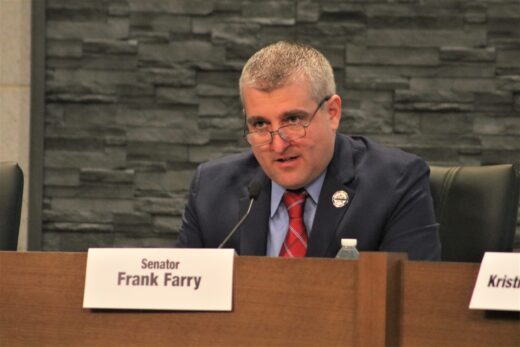Spotlight PA is an independent, nonpartisan, and nonprofit newsroom producing investigative and public-service journalism that holds power to account and drives positive change in Pennsylvania. Sign up for our free newsletters.
By Stephen Caruso | Spotlight PA

A long-debated state funding boost for public transit agencies appears dead in the water as the end of the legislative session looms in Harrisburg.
Public transit advocates remain hopeful that the issue will be back on the table next year, or that policymakers will once again agree on last-minute stopgap funding. But for now, metro-Philadelphia transit agency SEPTA, the state’s largest, is staring down a multimillion-dollar funding shortfall that could lead to fare hikes and service cuts.
“Folks in the building need to prioritize what they want to do,” state Sen. Frank Farry (R., Bucks) told Spotlight PA of the tangled policy negotiations that have made a deal elusive.
Democratic Gov. Josh Shapiro supports increasing how much money Pennsylvania sends to the state’s 57 transit agencies annually, as do Democrats who control the state House.
But to do so, they need buy-in from the state Senate, and Republican leaders say they’re willing to boost transit funding only if there’s a stable revenue source. Their cash cow of choice is regulating and taxing skill games, slot machine-like terminals that have proliferated in taverns, convenience stores, and social clubs.
But there’s a divide within the caucus about how to do this, and top lawmakers including Majority Leader Joe Pittman (R., Indiana) have not publicly taken a stance on the specifics.
Farry, whose district encompasses parts of SEPTA’s sprawling network and the state’s largest casino, has been pushing leadership to consider legislation that would tax skill games closer to the rate levied on slot machines. His lobbying has so far proved fruitless.
As of Oct. 15, the state Senate had not voted on any gaming expansion, with only five voting days left before the end of the session.
Transit agencies nationwide face lower ridership, which cratered during the pandemic and still has not fully recovered to previous levels due to changing commuter habits in the age of remote work.
The federal government provided stimulus dollars to transit agencies, but that money is now running out.
Transit already receives a sizable state subsidy. In 2023, Pennsylvania transferred roughly $2 billion in sales tax revenue to the commonwealth’s agencies. But advocates say more investment is needed to help agencies handle inflation while meeting new transportation needs. Without this aid, they warn, fares will go up and services will be cut, which could send agencies into a death spiral.
Transit agencies across the state are affected, but the problem is particularly acute for SEPTA because of its size.
If the authority doesn’t get additional funding, “We would have to start moving early next year on what would really be massive cuts coupled with significant fare increases,” SEPTA spokesperson Andrew Busch told Spotlight PA.
“We would be looking at fare increases of up to 30% coupled with service cuts of up to 20%,” Busch added.
Transit agencies in neighboring states have faced similar funding challenges. New Jersey recently approved a new tax on corporate profits to fill its commuter rail agency’s shortfall.
New York City’s transit agency is facing budget woes after Democratic Gov. Kathy Hochul axed a plan to tax drivers entering the city during periods of heavy traffic. While Hochul promised to fill in the $1 billion hole her decision created, legislators ended their session without a deal to do so.
Now, Pennsylvania’s legislators are poised to do the same.
The magic number
In his 2024 budget proposal, Shapiro pitched a 42% tax on daily gross revenue from skill games, which he estimated would yield about $150.4 million for the state in the next fiscal year, and grow thereafter. He also proposed a $1.5 billion increase in state funding for public transit over the next five years.
Neither of Shapiro’s pitches made it into the final deal, though a last-minute push by Philadelphia Democrats did net transit a one-time boost of $80 million.
The fight over regulating skill games, which for a decade have operated in a legal gray area, pits manufacturers of the devices against casinos and the makers of similar gaming devices. All want to maintain or strengthen their position in the gambling and gaming marketplace.
Transportation also has competing interests: Lawmakers must balance the needs of rural, car-dependent constituencies against urban and suburban communities that use mass transit.
Neither issue is neatly partisan, and skill games in particular divide state Senate Republicans.
The caucus hasn’t coalesced around a bill that bridges its internal schism over the right way to tax and regulate the games.
A proposal from state Sen. Gene Yaw (R., Lycoming) would tax skill games at a 16% rate without oversight from the state’s gaming board, which is what operators want. Yaw, whose Williamsport-based district includes a skill games manufacturer, argues that the machines are a lifeline for small clubs and taverns struggling to stay afloat.
Farry’s bill would impose a 32% tax rate and state gaming board control, an approach favored by skill games competitors including casinos and the makers of similar devices. Supporters say this approach would result in more tax revenue and prepare the commonwealth for any similar gaming device that enters the market.
Farry called Yaw’s proposal a “giveaway” to skill games, but he said he doubts his bill will placate casinos.
“I have language they wanted,” Farry said of the casinos. “This is not it.”
Democrats who control the state House haven’t publicly proposed a skill game plan.
State Rep. Ben Waxman (D., Philadelphia), an outspoken advocate for SEPTA funding, told Spotlight PA that for there to be a deal, state Senate leaders need to say how they are comfortable raising revenue.
“I have my own ideas of what I like, but they may not be palatable to the other chamber,” Waxman said. “They have to lead and figure out what they want.”
Waxman described himself as “probably one of the most liberal, pain-in-the-ass members in the caucus,” and is concerned that Pennsylvania’s gaming expansion has left people vulnerable to gambling addiction without support. He’s also heard concerns from neighborhood groups concerned about convenience stores becoming mini-casinos.
But even with those concerns, Waxman said he’d vote for regulating skill games if it meant sustainable funding for the state’s buses and trains.
The whole Democratic caucus, Waxman said, has “a willingness to compromise and stick together. But we need to be presented with something.”
The state House advanced three different bills this session that would boost transit funding, including a $311 million bump. The state Senate hasn’t considered any of them.
For Waxman, this highlights the challenges of divided government.
“People have to get comfortable with the idea that the Senate has power,” he said. “There is no magic wand to make them do anything.”
As the clock ticks down, Capitol insiders have expressed frustration that Shapiro has not, they said, prioritized the issue in closed-door talks or offered a solution to break the deadlock.
In situations like this, the governor can play a key role in sitting everyone down to broker a compromise. However, three sources said, no such conversation has taken place.
A Shapiro spokesperson disputed that the governor has not been directly involved in talks.
“The Governor is committed to supporting the 1 million Pennsylvanians who rely on public transit every single day, and he will continue working to deliver the additional resources our public transit agencies need,” spokesperson Manuel Bonder said in an email.
A temporary option, floated by two Capitol observers familiar with the issue, would be for Shapiro and the legislature to find another one-time source of funding and provide some stopgap money to keep agencies like SEPTA from making any drastic changes as they negotiate a final deal next year.
Neither Shapiro, state House Democrats, nor Senate Republicans commented on the odds of such an option. Farry, though, is still holding out hope that a deal could come together.
“I always remain optimistic until I have a reason not to,” he said.
BEFORE YOU GO… If you learned something from this article, pay it forward and contribute to Spotlight PA at spotlightpa.org/donate. Spotlight PA is funded by foundations and readers like you who are committed to accountability journalism that gets results.
Advertisement

Convenient Legal Access to High Quality Cannabis Just A Few Minutes Away!










